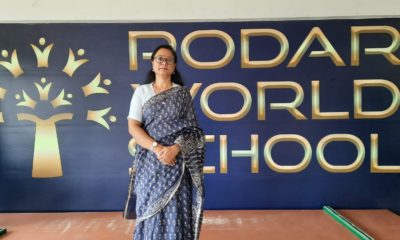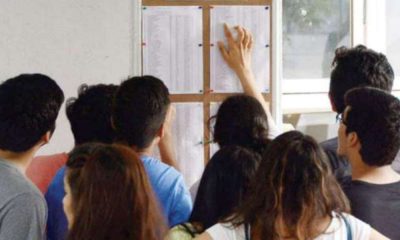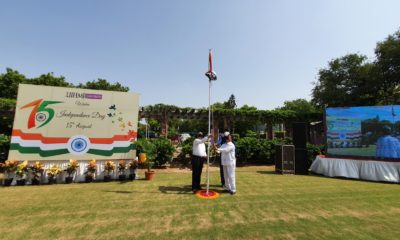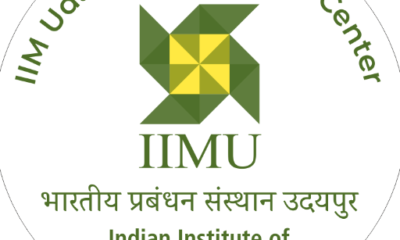Colleges
Experts from Indonesia, Bangladesh, and India discuss People, Pandemic, and Public Health

Experts from Indonesia, Bangladesh, and India discuss People, Pandemic, and Public Health at SD Gupta School of Public Health
IIHMR University conducts webinar that reflects on Strengthening Health Systems in South East Asian Countries
- Pandemic, People and Public Health are interlinked
- Transform the medical care system into the healthcare system by strengthening the public health system
- 6 disease conditions declared as Procedures Concerning Public Health Emergencies (PHEIC) in the last 12 years
- Public and Medical care system must be combined for the better healthcare system
- The well-functioning primary healthcare system must be existent
- There is no replacement for a functioning Government healthcare system during a pandemic or otherwise
- 60% of the mortality in Bangladesh is due to communicable diseases
- Aligning Preventive, Promotive, and Curative healthcare is the need of the hour
The year 2020 has brought everyone’s attention, including the policymakers and public healthcare specialists, towards health as the pandemic brought a massive change in strengthening the entire health ecosystem. COVID-19 is not the first Pandemic experienced, in fact in the last 12 years there have been 6 disease conditions declared as Procedures Concerning Public Health Emergencies (PHEIC). Hence, there is a need for more robust public healthcare systems that reflects on health system preparedness and how we address it. Experts from India, Indonesia and Bangladesh shared their insights at a webinar conducted by SD Gupta School of Public Health at IIHMR University Jaipur on ‘People, Pandemic and Public Health – Reflections for Strengthening Health Systems’.
Eminent speakers such as Dr. Chandrakant Lahariya, National Professional Officer, WHO, and the lead author of Till We Win: India’s Fight Against COVID-19 Pandemic along with other panelists, Dr. Yodi Mahendradhata, Vice Dean for Research and Development, Faculty of Medicine, Public Health and Nursing, Universitas Gadjah Mada, Dr. Malabika Sarkar, Director of Research & Lead Center of Excellence for Science of Implementation and Scale-Up, Bangladesh Rural Advancement Committee (BRAC ) James P Grant School of Public Health, Dhaka, Bangladesh, Padma Shree recipient, Padmashree Dr. Chandrakant S. Pandav, Former Professor &Head, Centre for Community Medicine at the All-India Institute of Medical Sciences (AIIMS), New Delhi shared their insights. Dr. D.K.Mangal, Dean Research, IIHMR University, moderated the session.
Dr. PR Sodani, President, IIHMR University, said, “A healthy future can only be attained by emphasizing on public policy and by putting wellbeing and health at its epicenter. One must focus on the process of gathering evidence, draw suggestions, assess the approaches, summarize and then conclude to bring out the right outcome in public health. This webinar focused on the preparedness for a future crisis, stresses on the challenges and their equivalent solutions in public health, and how populations can be made healthier for future resilience. COVID-19 has given us lessons to learn how to convert the challenges into opportunities.”
Dr. Chandrakant Lahariya, National Professional Officer of World Health Organization in India and the lead author of a recently released book titled “Till We Win: India’s Fight Against the COVID-19 pandemic,” said, “The COVID-19 pandemic has taught us the importance of people’s participation and community engagement for a healthy society, this could be seen in a case of Dharavi Mumbai. The medical care system based upon hospitals and treating the sick only is not enough. We need a strong public health system to ensure diseases are prevented and a healthy lifestyle promoted. There is a need to transform the medical care system into the healthcare system by strengthening the public health system. 1 in 8 persons in India is suffering from a mental health condition and the Pandemic has taught us to focus on this issue.”
Dr. Yodi Mahendradhata, Vice Dean for Research and Development, Faculty of Medicine, Public Health and Nursing, Universitas Gadjah Mada, Indonesia said, “We need to take stock of opportunities that COVID-19 Pandemic has thrown at us. This pandemic has given us an opportunity for an equitable health system and has put this issue in the forefront. Building a strong healthcare delivery system through telemedicine and telehealth and COVID-9 has accelerated their use. This has majorly helped the healthcare workers in Indonesia with no personal involvement or virtually. There is much more attention given to the health of healthcare professionals including their mental health and well-being. Capacity building and training of healthcare professionals have increased due to the COVID-19 pandemic. COVID-19 also pointed out that Health Research and innovations are no longer a luxury but are a necessity. These opportunities must be taken up and must be actioned for a better public healthcare system.”
Speaking on the various opportunities and challenges faced during the Pandemic in Bangladesh Dr. Malabika Sarkar, Director of Research & Lead Center of Excellence for Science of Implementation and Scale-Up, Bangladesh Rural Advancement Committee (BRAC) James P Grant School of Public Health, Dhaka, Bangladesh said, “The COVID-19 pandemic has made the country explore opportunities and challenges as the country does not have a very structured health system. Telemedicine is an opportunity well explored by the country with a population of 165 million 162 million who use mobile phones however, lack of connectivity is a big challenge. There is a great disparity in the doctor to the population ratio. 60% of the mortality in Bangladesh is due to communicable diseases. The discontinuity of maternal & child health, including non-communicable disease care, increases the vulnerable population’s burden. The government is engaging the Non-Government organization which is an opportunity. Strengthening the community clinic is important where developing primary healthcare channels are important.”
Dr. Malabika expressed, the ongoing disruptions of essential health services are the most critical challenge for the health system. Dr. SD Gupta School of Public Health can focus on emerging alternative strategies such as telemedicine using phone or internet, triaging to determine priorities, and online supply of drugs indicate the human being’s resilient nature.
The webinar explored that there is an urgent need for interlinking People, and Public Health and transformation of healthcare systems by working with key stakeholders. SD Gupta School of Public Health (SDG-SPH) can be instrumental to make policy interventions for better interlinking of stakeholders to bridge the gaps between education and practices of public health across the globe.
MEDIA RELEASE









































